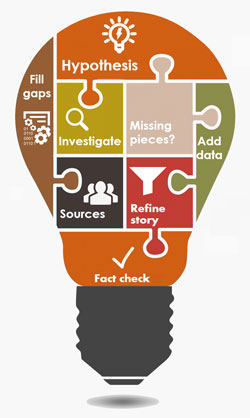
Top stories






More news


Marketing & Media
Ads are coming to AI. Does that really have to be such a bad thing?













On the accusation side, an investigative journalist needs to know when to "call it" - knowing when s/he has a story backed up by sufficient facts to make and prove a compelling case. Calling it too soon can lead to legal action or Press Council complaints. And being too light on the supporting evidence side, may mean the law and the council will not be the journalist's corner.
On the overload side, an investigative journalist may well get lost in a thicket of facts and forget the narrative, leaving their readers wading through numbers and trying to untangle complex webs of relationships between protagonists, all the while wondering what the point of the story is "Writing up the facts proves that the journalist has done their homework, but doesn't say why the information is important to the readers." says Michael Schmidt, director of the Institute for the Advancement of Journalism (IAJ), whose own investigative journalism book is about to go to press.
By putting storytelling front-and-centre, the investigation not only follows a clear strategic path it is also more likely to make an impact with the result being a compelling narrative about an issue of public interest.

"By having the story inform the investigative process, from story idea to research, from writing to fact-checking, to publication, reporters will be able to embark on a highly-targeted, efficient and systematic investigation of the issue at hand," says veteran investigative journalist and IAJ senior facilitator Birgit Schwarz.
This doesn't mean that the investigative journalist will not have to be tough, creative, and thorough in getting the story. On the contrary, like the two crusading Watergate reporters, Bob Woodward and Carl Bernstein, showed, good investigative journalism usually involves lots of unglamorous after-hours legwork, and dogged crosschecking.
The sheer volume of information investigative journalists have to deal with in most investigations means that it is critical not to lose sight of your strategy (the story you want to tell), and your tactics (how you get the information you need, in what order and what your fall-back options are should you be blocked).
You should never be fishing for information in the wrong pool, or filling up your reporter's notebook with irrelevant facts (even if they are captivating). Instead, you must be able to focus on collecting relevant information from day one - and yet be flexible to pursue other potential lines of inquiry.
A story-based approach gives investigative journalists a 'can-do' attitude, which can be applied to any topic, whether it is the more conventional corruption story aimed at fingering the bad guy, or a groundbreaking story on sea-changes in sports, environmental hazards, economic mismanagement, or rights abuses.
Investigative journalism should never be the preserve of a few specialist journalists, but part of the skill-set of every journalist with the doggedness and smarts to get the story - even in the midst of a hectic newsroom.
"But I don't have time!" busy journalists may say. Looking at the enormous potential scope of the work, without the story in mind, may deter even the most determined journalist, but a holistically planned storyline helps them jump in the deep end, knowing they can swim.
The storytelling approach to investigations shows journalists where to dig and how deep to dig. Investigations follow the money and track the relationships, so a story-based approach shows newshounds what money and which relationships to focus on. Based on a birds'-eye hypothesis the approach will show you where the missing pieces on the map are: what's buried?; who knows where to find it? And what elements can be verified quite easily?
Instead of being led around by the nose by anonymous sources, not-all-that-reliable witnesses, or people with an agenda, the journalist is in charge of his/her investigation. With a sound framework of documentary evidence in place, human sources merely fill in the gaps.
Good investigations also show the impact on people: babies without incubators; students without textbooks; a community's health threatened by polluted water. Herein lie the real stories: instead of swamping the reader with data, the story tells the facts in a way that demonstrates to the readers the tale's relevance to her/his live, and which makes a compelling case for the need for change.
The Institute for the Advancement of Journalism's Investigative Journalism course will be taking place from 26-28 August 2014. For more information email az.gro.jai@tnirp.
